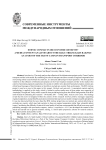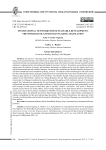Современные инструменты международных отношений. Рубрика в журнале - Вестник ВолГУ. Серия: История. Регионоведение. Международные отношения

Статья научная
Introduction. The study analyses the reflection of the infrastructure projects on the Trans-Caspian transport corridor in the media. By combining the roles of transport corridor as a means of regional cooperation and overcoming ethnic issues between the countries, it is aimed at addressing two main questions. The first question would be on the reflection of infrastructure projects on the Trans-Caspian transport corridor in the media in the context of promoting regional cooperation, the second on whether news about infrastructure projects contains any ethnic based messages of discrimination or hostility to exclude any country from such projects. The BTK railway project is used as a case in this paper in this respect. Methods and materials. A conceptual content analysis methodology is applied in this study, which is limited to online media news of three major news agencies of Azerbaijan, Georgia and Turkey within a specific time period beginning from the official inauguration of the BTK until the date of conducting this research - 30 October 2017 - 15 May 2020. Analysis and results. The findings reveal that the news investigated within the context of this research involves positive messages supporting regional cooperation, mutual benefits and common interests that mayhave an incentive impact on public perceptions. It was also discovered that the news about the BTK railway project does not contain any content otherizing or excludes any country, which may help societies to focus on regional cooperation rather than vulnerable ethnic issues. Considering the difficulty of control of social media, it has been recommended that official news may avoid publishing messages with provocative content. Authors’ contribution. A.N. Uste developed the content of the article and carried out its general scientific editing. U. Sanili Aydin proposed a scheme for research analysis. The authors jointly analyzed the results.
Бесплатно

International networks for sustainable development: the world bank and Russian flaring legislation
Статья научная
Introduction. This paper deals with the international environmental norms on combatting the flaring of Associated Petroleum Gas (APG) and its adoption by Russia (decrees no. 7 and 1148). Flaring, or the systematic burning of associated gas during oil production, leads to the release of carbon dioxide and other harmful substances, endangering the surrounding and global environment. Methods. The authors use qualitative methods resting upon the analysis of primary and secondary documents, including articles from the media, legal texts, official communications and scholarly literature, to trace back the conditions that brought about the emergence of a distinct international norms condemning flaring. Analysis. The analysis of the norm through its life cycle reveals that the multi-faceted framing strategies employed by the Transnational Advocacy Network allowed the issue of flaring to gain salience in a relatively short timeframe. The flexible, durable, technical and apolitical approach adopted by the World Bank’s Global Gas Flaring Reduction Private Public partnership explains the Russian Government’s willingness to address the issue of flaring and to legislate on APG utilization. Results. The findings suggest that international campaigning for environmental protection need not be confrontational and that transnational advocacy networks may gain in efficiency if they adopt targeted strategies and systematically recode their message for each group of actors they plan to sensitize. Authors contribution. This article is based on research carried out by one of the authors, Anne Crowley-Vigneau for her dual doctoral thesis on international norms and Local Content policies completed at MGIMO University and the University of Reading. As the coordinating author she gathered the primary data through expert interviews. Andrey Baykov participated in coding, triangulating the data and studying legal documents. Prof. Yelena Kalyuzhnova, the supervisor of this research, provided guidance and created the research methodology. The writing of the paper was a joint effort of all three authors.
Бесплатно

